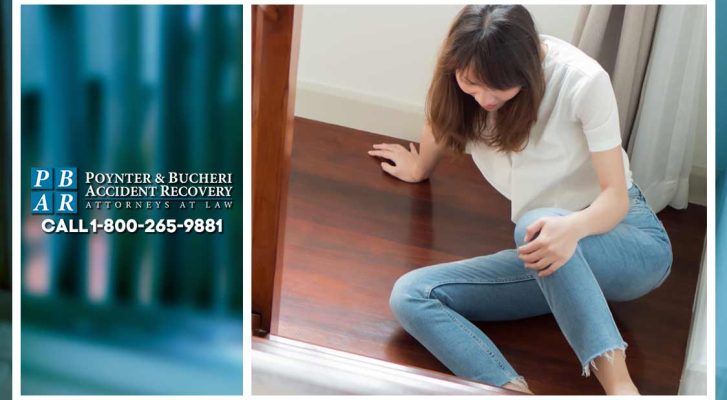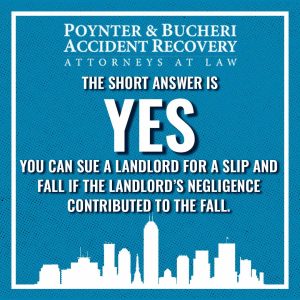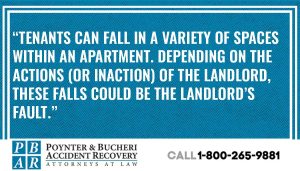
Can I Sue My Landlord for Slip and Fall?

Landlords are supposed to maintain a safe and secure property for their tenants. If an Indiana landlord fails to provide that safe environment and a tenant slips and falls, what recourse does the tenant have? Can I sue my landlord for a slip and fall?

The short answer is yes. You can sue a landlord for a slip and fall if the landlord’s negligence contributed to the fall.
Indiana tenants have the right to a safe, habitable property. That means that hazardous conditions that could cause a slip and fall must be addressed by the landlord. If you have been injured by slipping and falling in your apartment or rental property, and are wondering “Can I sue my landlord for slip and fall?” , reaching out to an experienced Indiana slip-and-fall attorney is the best way to determine your next best steps!
Why do people slip and fall at a rental property?
There are many reasons why someone might slip and fall at their apartment or rental, but some of the most common reasons include:
- Wet floors
- Uneven surfaces
- Poor lighting
- Clutter in walkways
- Damaged stairs/railings
- Lack of handrails
- Worn carpeting
- Missing floor mats
- Icy sidewalks
- Overgrown landscaping
We know that people often find themselves asking, “Can I sue an apartment for negligence?” if the company or individual who manages your apartment has been negligent in maintaining a safe environment, you should definitely speak to an attorney about your options for filing a lawsuit or personal injury claim.
Where do slip-and-falls occur?

Tenants can fall in a variety of spaces within an apartment. Depending on the actions (or inaction) of the landlord, these falls could be the landlord’s fault.
For example, common areas must be maintained and safe. If a landlord failed to install effective lighting, replace old carpets, or repair uneven surfaces, these hazards could cause someone to fall.
Stairwells are another place where falls can occur. Poor lighting is a common culprit here, too, as are missing or broken handrails, worn down and slippery surfaces, and unsafe spills.
Your landlord is responsible for keeping any private parking areas safe, too. That includes good lighting, safe surfaces, and appropriate snow and ice removal in the winter.
What about falls inside my apartment?
It may be more challenging to prove that a fall inside an apartment was the direct result of a landlord’s improper actions. Still, if the accident was caused because of an obvious negligence issue or a problem that you reported but was never fixed, you likely have a case.
What kind of injuries are caused by a slip and fall?
Injuries in a fall can range from minor to catastrophic. Every fall is different, based upon the conditions of the fall, how far you fell, your age and general health status, and how your body hit the ground.
Common slip and fall injuries on rental property include:
- Sprains
- Strains
- Bruises
- Abrasions
- Broken bones
- Head injuries
- Back injuries
- Hip fractures
- Knee injuries
- Shoulder dislocations
- Wrist fractures
- Ankle sprains
- Elbow fractures
- Facial lacerations
Each of these injuries is accompanied by financial and non-economic costs. For example, you may need x-rays, surgery, a hospital stay, and physical therapy for many of these injuries, but that doesn’t mean that the damages are limited to economic losses. These injuries can also change your life.
Pain, suffering, and losing the ability to work are just some of the long-term impacts of serious fall injuries.
What to do after a slip-and-fall at an apartment complex or rental
If you slipped and fell at your rental property, you have rights. However, you have to take certain steps to protect those rights.
We recommend the following steps.
- Seek medical attention for your injuries right away.
- If you are able to take pictures or videos of the fall, that is excellent! Evidence is important.
- If you can’t take pictures because you are in the hospital, ask a trusted family member or friend to take photos for you.
- File an incident report with the property manager or landlord, informing them of what occurred. Keep a copy of this report.
- If other people were present, collect eyewitness statements about what they saw. At the very least, try to collect contact information for anyone who was there when you fell.
- Contact a slip-and-fall attorney to discuss your unique case and strategize what to do next.
What NOT to do after a slip-and-fall
Some things can make it harder to collect damages for your injuries and non-economic losses.
For example, you should not provide a written or recorded statement to the insurance adjuster for your landlord, as they may try to use that recording or statement to twist your words and make it seem like you were accepting liability for something that wasn’t your fault.
Additionally, you should not accept a settlement that the landlord’s attorney or insurance company offers right away. That’s because their job is to resolve the situation as quickly and as cheaply as possible. They are not on your side!
Why you should work with a personal injury attorney after your slip-and-fall
A personal injury attorney who is experienced in dealing with slip-and-fall accidents can be an amazing resource for you as you navigate the aftermath of your accident.
Your attorney can help you collect evidence, understand the laws related to personal injuries, and make sense of your options.
At Poynter & Bucheri Law Attorneys at Law, we work on contingency. That means that you don’t have to pay anything to get started. In fact, you only pay attorney’s fees if we win your case! That means that working with us is risk-free.
Contact Poynter & Bucheri For a Free Case Review
If you have been injured in a slip-and-fall accident because of your landlord’s failure to maintain a safe property, we can help. Suing for slip and fall accidents is about ensuring that landlords are held responsible for their failure to provide a safe living environment for their tenants.
Contact the slip and fall accident attorneys at Poynter & Bucheri to schedule a free case review for your accident.
We offer a free, no-obligation case review. This is your opportunity to share your story, ask your questions, and learn more about your options. Call 1-800-265-9881 for a free case review.
